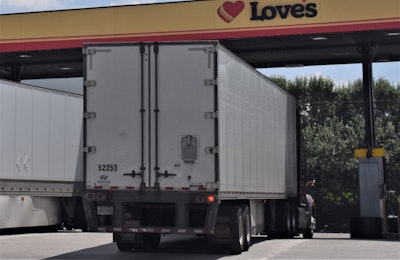 Though fuel taxes remain the most efficient way to collect the taxes that fund roads, increasingly miles-traveled taxes have been considered to account for all-electric vehicles, particularly. Amid broad debate about the various alternatives available, Connecticut's legislature followed through on the state's governor's proposal to levy a truck-only miles tax. The bill there puts the program in place as of January 2023.
Though fuel taxes remain the most efficient way to collect the taxes that fund roads, increasingly miles-traveled taxes have been considered to account for all-electric vehicles, particularly. Amid broad debate about the various alternatives available, Connecticut's legislature followed through on the state's governor's proposal to levy a truck-only miles tax. The bill there puts the program in place as of January 2023.
After years of failure in a bid to levy truck-only tolls in Connecticut, Gov. Ned Lamont early this year proposed a miles tax on heavy trucks using roadways in the state. The legislature passed such a measure within the last 24 hours.
Under the terms of the bill, starting in January of 2023, carriers would be required to calculate and file returns monthly with Connecticut based on miles run on roads in the state. Fees would be set up to depend on weight, ranging from 2.5 cents a mile at the 26,000-28,000-lb. range to 17.5 cents/mile for 80,001 pounds and above. The bill levies 10 cents a mile on rigs weighing in at 78,001-80,000 pounds, which Connecticut-based independent owner-operator Joe Bielucki described as "huge, about $4,000 to $5,000 a year for me."
Bielucki believes other states would be likely to "try this as the feds look at a truck-only [vehicle miles traveled tax] also."

Speaking at the Truckload Carriers Association Safety & Security Division annual meeting June 8, TCA government affairs lead David Heller cast all the interest in vehicle-miles-traveled schemes in the context of growth in the markets for electric vehicles, principally on the passenger car side but also coming into play among heavy trucks. Fully-electric vehicle owners aren't paying into the highway trust fund on an ongoing basis, given it's principally funded by the fuel tax.
[Related: Battery-electric powertrains lead advancements in clean tech despite growing pains]
More than 30 states have raised fuel taxes in some form over the last several years, he added. Federally, however, "the GOP does not want a tax increase." The federal fuels tax hasn't been raised in decades, though "it's a sensible way to collect those dollars." Heller noted just a 1% administrative cost for collection of per-gallon revenues.
For VMT, "right now," he said, it's "nowhere near that," costing by some estimates as much as 40% of revenues to collect.
Heller and TCA favor a fuel tax increase now and long-term real engagement on policy around potential VMT.
Missouri Trucking Association President Tom Crawford, who presented briefly at the TCA event, held in St. Louis, noted his association supported the increase on tap in the state, which will over years add 12 cents a gallon to the fuel tax, with a refund option for passenger-vehicle drivers who "keep their receipts" and apply for the rebate, he said.
Truckers run "13% of the miles and supply 43% of the revenue" in the state as it is, Crawford said. "That’s going to go up for us."
Ten cents a mile, as Connecticut's bill requires on top of existing fuel taxes, is a whole lot more than 12 cents a gallon, as owner-operator Bielucki knows. "If these kind of taxes pass," he said of Connecticut's bill, awaiting the governor's signature, "this will impact all aspects of trucking and be very burdensome. Crazy times we're in. It's tough to raise rates [again] in the current market after we just raised ours this year." His local rep in Connecticut planned to vote against the truck-only bill in Connecticut, yet "she is in the minority party."
According to reports, it passed the state House 88-49 Tuesday, then the state Senate 22-14 in the wee hours Wednesday.
[Related: Texas senator floats truck-only miles tax]










